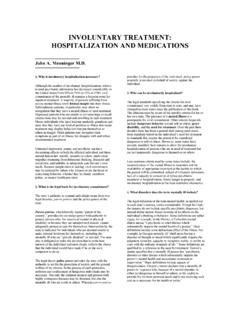Transcription of North Carolina Statutory Changes for Involuntary ...
1 HB 243 - Mental Health/Law Enforcement Custody North Carolina Statutory Changes for Involuntary commitment Overview Effective October 1, 2009, the Statutory requirements for Involuntary commitment for mental health treatment1 have been amended to allow for termination of proceedings by the interim facility if the patient no longer warrants commitment or has not been placed at a 24-hour facility within Background HB 243 is intended to provide clarification to current Involuntary commitment According to bill sponsor, Representative Verla Insko, the Changes are needed because [t]he current law is not clear on what should happen when a person is taken to an ED for an Involuntary commitment if the [1]st level commitment finds the person is a danger to self or others and for whatever reason, they cannot be taken on to a state institution[] for the 2nd level commitment . 4 Statutory Changes HB 243 amends 122C-263(d)(2) to include two ways for the Involuntary commitment process for mental health treatment to be terminated at the interim facility.
2 The amendments are applicable when the following criteria are met: 1. the patient is at the site of the first examination and is under appropriate supervision5; and 2. a 24-hour facility6 is not available or is not appropriate for the patient s medical Termination of the Involuntary commitment Process at the Interim Facility A. A physician/eligible psychologist at the interim facility may break the Involuntary commitment any time he/she determines that the patient no longer warrants Involuntary However, the physician/eligible psychologist has the option to recommend outpatient commitment if the patient meets applicable Utilization of either of these must be documented and reported to the clerk of superior According to Rep. Insko, this allows the clinical staff at the local level to determine if the person needs to go on to the state institution or if they can be released. 11 1 There are two types of Involuntary commitment in North Carolina mental health treatment and substance abuse treatment.
3 A basic overview of the requirements for each may be found in the NC Civil commitment Manual at (May 2006). See also North Carolina Department of Health and Human Services, North Carolina DHHS On-line Manual, Chapter VII: Protective Services for Adults (B) (1), available at (last visited Sept. 9, 2009). Involuntary commitment for mental health treatment includes requirements that the patient be mentally ill and a danger to self or others. 2009 Sess. Laws 340(2)(d)(2). See also NC Magistrates Association, Involuntary Commitments, at (Sept. 9, 2009). 2 2009 Sess. Laws 340. 3 Email from Verla Insko, Representative, General Assembly of North Carolina to Megan Lee, Director of Risk Management, Catawba Valley Medical Center (July 28, 2009 at 4:53pm EST)(on file with author). 4 Id. 5 2009 Sess. Laws 340(1)(d). See also 2009 Sess. Laws 340(2)(d)(2). 6 See 122C-252 (2008). See also for a list of facilities. 7 2009 Sess. Laws 340(2)(d)(2). 8 Id.
4 9 Id. 10 Id. 11 Insko, supra note 2. B. Involuntary commitment proceedings will expire 12 if the patient has been temporarily detained for more than seven (7) days after the date of the custody order without admission to a 24-hour The physician or eligible psychologist must report this to the clerk of superior court and the proceedings will be However, new commitment proceedings may be initiated if Any affidavits or examinations used as part of the previous proceeding will not be permitted to support the new NOTE: HB 243 amends the process for Involuntary commitment for mental health treatment and does NOT apply to Involuntary commitment for substance abuse treatment under 122C-281 through 294. Conclusion The Changes under HB 243 will substantively affect the way facilities address Involuntary commitment patients who are awaiting bed placement at a 24-hour facility. These Changes also apply to facilities that do not have psychiatric beds but are capable of providing the first examination and holding the patient until the appropriate bed becomes available.
5 Emergency departments will be most impacted by these Changes because these patients are often being held for lengthy periods of time while awaiting placement at a 24-hour facility. Risk Management personnel need to be aware of the Statutory Changes and assist in having the appropriate processes in place by October 1, 2009. This should include review and revision of the facility s current policy and/or procedures, dissemination of information to all necessary parties including applicable physicians and psychologists and monitoring for compliance after the effective date. Megan J. Lee, RN, JD, CPHRM Director of Risk Management Catawba Valley Medical Center 12 Id. 13 2009 Sess. Laws 340(2)(d)(2). 14 Id. 15 Id. 16 Id.




